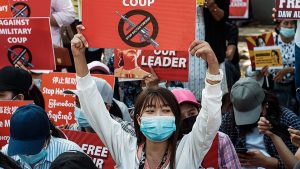More than two and a half months have passed since the coup in Myanmar. Although other countries are responding to this situation, they have not been able to have a concrete impact toward stopping the bloodshed that is happening in Myanmar, sparking harsh criticism from observers like the BBC.
Likewise, there has been criticism toward Japan for its ambiguous position compared to other countries, especially since it has not imposed aggressive economic sanctions. The Japanese government’s response is attracting attention both at home and abroad, raising questions about how long it can continue its current stance.
On April 2, the Japanese government was asked about future sanctions in an open letter of inquiry by a group of Myanmar people living in Japan and Human Rights Now, the international NGO. The government’s reply was, “We will consider it in the future.” Foreign Minister Motegi Toshimitsu gave a similar response when asked at a press conference about the possibility of suspending Official Development Assistance (ODA).
During the press conference, Motegi quoted a line from “The Little Prince” by saying, “What is essential is invisible to the eye.” In its response to the earlier open letter, the Ministry of Foreign Affairs cited the example of the Japanese ambassador meeting the foreign minister appointed by the junta, and said that Japan would continue to play its “unique role” in the crisis.
Motegi was asked in the Diet this month about Japan’s response to the situation in Myanmar. This time, he cited one of Aesop’s fables: “Like the north wind and the sun, it will be difficult to overcome this severe situation without a combination of various means.” The fable recounts the north wind and the sun competing to get a traveler to remove his cloak. The north wind is unable to achieve the task, no matter how angrily he blows – the sun wins the contest by shining warmly down upon the traveler until he willingly takes off his cloak. The moral: “Gentleness and kind persuasion win where force and bluster fail.”
This position of the Japanese government has been met with criticism. Major Japanese media reported that the Japanese government’s response to the above-mentioned open letter was met with disappointment from Myanmar citizens living in Japan. Criticism has also come from some of Japan’s academic and political community.
Despite this criticism, why has Tokyo not joined other countries in imposing economic sanctions? In his poetic statements, Motegi might be suggesting the existence of diplomatic efforts that have not been revealed to the public. If we listen carefully to the answers given by him and others from the Foreign Ministry in the Diet, we can see that Japan’s actions toward the Myanmar military are based on cooperation with other countries, including the United States. The “unique role” that the international community expects Japan to play might be to act as the “sun” out of the fable, and to bring the Myanmar military junta into dialogue through gentle persuasion. In this case, Japan’s ODA will be the key. Suspension of ODA by Japan, the largest contributor to Myanmar except for China, would be a major diplomatic card to play, and Tokyo will probably use it as leverage to seek dialogue.
Comments from the U.S. government support this idea. At a background press call held on April 15, just prior to the Japan-U.S. summit, the White House expressed a favorable position on Japan’s diplomatic contributions when asked if the president planned to push Japan to take a stronger position on Myanmar. The senior administration official clearly mentioned that Japan has been “very active… behind the scenes,” by “encouraging ASEAN to engage proactively with… the junta” and trying to to keep lines of communication to imprisoned civilian government leaders.
If the Japanese government is seeking to use its quiet diplomacy to play the role of “the sun,” it faces a difficult road ahead. In the first place, the chances of the military and the newly declared National Unity Government coming to the negotiating table are becoming less and less every day. In addition, if Japan is avoiding imposing sanctions in order not to keep alive the possibility of dialogue with the junta, it will be exposed to criticism in the meantime. As I wrote in the article last month, when the Japanese ambassador met the military junta ahead of other countries, there was a great deal of criticism from the people of Myanmar and Japan. As a result, it would have been difficult to publicly appeal for dialogue with the military side after that. As mentioned above, members of the opposition parties in the Diet have been actively taking up the issue of Myanmar, and some people from Myanmar living in Japan have begun to reveal their distrust of the Japanese government’s response.
Furthermore, the Japanese Embassy confirmed that a Japanese journalist was detained by the military on the night of April 18 and moved to Insein Prison. It will be even more difficult for the Japanese government to continue to seek dialogue in a situation that has now directly involved Japanese citizens.
At a time when the condemnation from Western countries has not had an explicit effect, it is questionable whether a decision from the Japanese government to give up on dialogue and join the argument for sanctions would actually save lives among the local population in Myanmar. However, given the situation, there is a limit to Japan’s search for dialogue. The resolve of each country is being questioned once again as governments try to ease the devastation throughout Myanmar. And especially for Japan, the question is how long can it remain the “sun” instead of the “north wind”?

































